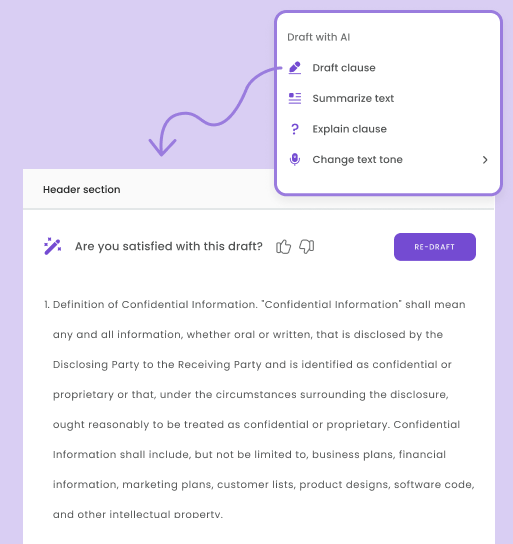We all know what contracts are because you’ve signed one at some point in your life. With that being said, not everyone knows the nuances of a valid contract. With the key elements, the contract may often be deemed unenforceable in a court of law.
In this guide, you’ll learn about the 6 elements of a valid contract, what each one means, and how to use them properly. When you use these elements in each of your contracts, you’ll drastically reduce the chances of a contract that cannot be enforced.
Offer and Acceptance
An offer is a proposal made by one party (the offeror) to another party (the offeree) expressing a willingness to enter into a legally binding agreement. It outlines the terms and conditions upon which the offeror is prepared to be bound if the offeree accepts those terms.
Intention to Create Legal Relations: For a valid contract to exist, there must be an intention to create legal relations between the parties. In other words, both the offeror and offeree must intend for the agreement to be legally enforceable. Social invitations, casual discussions, and agreements made in jest usually lack this intention and do not give rise to a legally binding contract.
Communication of Offer: To be effective, an offer must be communicated to the offeree. The offeror can communicate the offer in various ways, such as in writing, verbally, or through conduct. It is crucial that the offeree receives and is aware of the offer before they can respond to it.
Elements of Valid Acceptance: Acceptance is the offeree’s expression of agreement to the terms of the offer. For acceptance to be valid, the following elements must be met:
- Unconditional Acceptance: The acceptance must be unconditional and mirror the terms of the offer. Any modifications to the offer in the acceptance would be considered a counteroffer, which, in turn, requires acceptance by the original offeror.
- Communication of Acceptance: Acceptance must be communicated to the offeror or their authorized representative using the same medium or method used for the offer, unless otherwise specified.
- Timely Acceptance: In most cases, acceptance must be made within a reasonable time frame. If the offeror specifies a deadline for acceptance, it must be adhered to for the acceptance to be valid.
Meeting of the Minds
Meeting of the minds, also known as mutual assent or consensus ad idem, is a fundamental principle in contract law. It refers to the agreement and understanding between the parties to a contract regarding the terms and essential elements of the agreement.
In other words, it is the meeting of their intentions, where all parties are on the same page and have a clear understanding of what they are entering into.
Mutual Assent and Agreement: Mutual assent signifies that the parties to the contract have given their genuine consent to the same terms without any misunderstanding or misrepresentation. It ensures that the minds of the parties have met, and that there is a true meeting of their wills regarding the contract.
Role of Offer and Acceptance in Establishing Mutual Assent: Offer and acceptance are critical in establishing mutual assent. The offeror makes a proposal, and the offeree accepts the proposal, demonstrating their willingness to be bound by the terms of the offer. Once the acceptance is communicated, it forms the basis of the contract, and both parties are presumed to have a mutual understanding of the terms.
Importance of Clear and Unambiguous Terms: For a meeting of the minds to occur, the terms of the contract must be clear, specific, and unambiguous. Ambiguity or vagueness in the contract language can lead to confusion and potential disputes. It is essential that the terms are expressed in a way that both parties can comprehend their obligations and expectations.
Role of Communication in the Meeting of Minds: Communication plays a vital role in the meeting of the minds. Both the offer and acceptance must be effectively communicated between the parties to ensure mutual understanding. Any misunderstandings or discrepancies between the offer and acceptance can result in a lack of mutual assent, which may invalidate the contract.
During the process of contract formation, the parties should engage in clear and effective communication to ensure that they have a shared understanding of the terms and conditions. If there are any counteroffers or negotiations during the contract’s formation, they should be communicated clearly to avoid any misunderstandings.
In conclusion, the meeting of the minds is a foundational principle in contract law. It requires a genuine agreement and mutual understanding between the parties involved. Clear communication, unambiguous terms, and the proper exchange of offer and acceptance are essential for establishing mutual assent and forming a valid and enforceable contract.
Legal Capacity to contract
Legal capacity to contract refers to a person’s ability to enter into a legally binding agreement. It signifies that an individual has the mental competence and legal authority to understand the terms of a contract, to be aware of its consequences, and to be held accountable for fulfilling their contractual obligations.
Parties with Legal Capacity: Generally, parties with legal capacity are individuals who meet the following criteria:
- Age of Majority: In most jurisdictions, individuals must reach the age of majority (usually 18 years old) to have full legal capacity. Upon reaching this age, they are presumed to have the mental capacity to understand and enter into contracts.
- Mental Competence: Parties must have the mental capacity to understand the nature and implications of the contract. This means they are not mentally impaired or incapacitated, such as by mental illness or severe cognitive disabilities.
- Sobriety: Parties must be of sound mind and not under the influence of drugs or alcohol that might impair their judgment at the time of contract formation.
Parties without Legal Capacity: The following parties are generally considered to lack legal capacity to contract:
- Minors: Individuals who have not reached the age of majority are typically considered minors. While they may enter into certain contracts, such as for necessaries or education, most contracts they enter into are voidable, meaning they can choose to disaffirm the contract.
- Mentally Incapacitated Individuals: Those with severe mental illness or cognitive impairments may lack the capacity to understand the terms of a contract and are considered incapable of entering into legally binding agreements.
- Intoxicated Persons: Individuals who are heavily intoxicated or under the influence of drugs might lack the capacity to fully comprehend the contract and its consequences.
Consequences of Lack of Legal Capacity: If a party lacks legal capacity at the time of contract formation, the consequences can be significant:
- Voidable Contracts: Contracts entered into by parties lacking legal capacity are typically considered voidable. The party without capacity (e.g., a minor) can choose to disaffirm or cancel the contract, rendering it void from the outset.
- Restitution: In cases where a contract is voided due to lack of capacity, the parties are usually restored to their original positions before the contract was made. Any consideration or benefits received under the voided contract may need to be returned.
- No Liability for Breach: If a party without capacity breaches the contract, they might not be held liable for damages if they choose to disaffirm the contract.
The legal capacity to contract is a fundamental aspect of contract law. Parties with the requisite mental competence and authority can enter into legally binding agreements, while those lacking legal capacity may have the option to void or cancel the contract. It is essential to consider legal capacity when forming contracts to ensure their validity and enforceability.
Lawful Object or legality of the contract
The lawful object of a contract refers to the purpose or subject matter of the contract, and it must be legal and not against public policy. In other words, for a contract to be valid and enforceable, the object of the contract must be lawful and not involve illegal activities or go against established laws or public policy.
Contracts Contrary to Law: Contracts that involve illegal activities or violate existing laws are considered void and unenforceable. Examples of contracts contrary to the law include:
- Contracts for Illegal Goods or Services: Any contract that involves the exchange of illegal drugs, stolen goods, or services that are illegal or against public policy.
- Gambling Contracts: In some jurisdictions, contracts related to gambling may be considered illegal or void.
- Usury Contracts: Contracts with excessively high interest rates that violate usury laws. Note that usury laws vary by state so what may be invalid in one place may be legal in another.
- Contracts in Violation of Licensing or Permit Requirements: Contracts that require a license or permit, but one or both parties do not have the required authorization.
Contracts Against Public Policy: Contracts that are against public policy are also deemed unenforceable. These contracts may be considered harmful to society, and enforcing them would go against the greater good. Examples of contracts against public policy include:
- Restraint of Trade Contracts: Contracts that unreasonably restrict a person’s ability to engage in a trade or profession.
- Exculpatory Clauses: Contracts that seek to waive liability for gross negligence or intentional harm, which may be against public policy in some situations.
- Unconscionable Contracts: Contracts that heavily favor one party and are oppressive, taking advantage of the other party’s vulnerability.
- Contracts that Encourage Illegal Activities: Contracts that encourage or facilitate illegal conduct. This one can be vague because it’s not directly engaging in illegal activity. For example, leasing out a house to someone that sells drugs or driving a sex worker to the homes of their clients.
For a contract to be legally binding and enforceable, it must have a lawful object. The object of the contract must not involve illegal activities or go against established laws or public policy. Contracts that are contrary to law or against public policy are generally considered void and unenforceable by the courts. Ensuring that the object of the contract is lawful is essential for the validity and enforceability of the agreement.
Consideration
Consideration is a fundamental concept in contract law and refers to something of value given by each party to a contract in exchange for the promise or performance of the other party. In other words, it is the “price” or “bargained-for exchange” that makes a contract legally binding. Consideration can take various forms, such as money, goods, services, promises, or forbearance.
Adequacy of Consideration: In contract law, the adequacy of consideration refers to whether the value exchanged is fair or reasonable. Courts generally do not inquire into the adequacy of consideration as long as there is some form of value exchanged. The consideration does not need to be equal in monetary value; it can be a nominal sum as long as it has legal sufficiency and indicates a mutual intent to create a contract.
Past Consideration: Past consideration refers to a promise made in exchange for something that has already been performed or given in the past. In most jurisdictions, past consideration is not considered valid consideration, as there is no mutual exchange at the time of the promise. Consideration must be given in the present or future to support the enforceability of a contract.
Illusory Promise: An illusory promise is a statement or expression that appears to be a promise but, in reality, does not create any binding obligation on the promisor. Contracts that contain illusory promises lack consideration and are unenforceable. For example, a contract that states, “I will buy your car if I feel like it” would be considered illusory because it does not impose any obligation on the buyer.
Exceptions to Consideration: While consideration is a fundamental requirement for most contracts, there are a few exceptions where a contract may be enforceable without traditional consideration:
- Promissory Estoppel: In certain circumstances, a promise may be enforced even without consideration if the promisor should have reasonably expected the promise to induce reliance by the promisee, and the promisee did rely on the promise to their detriment.
- Seal or Deed: In some jurisdictions, a contract under seal, also known as a deed, does not require consideration to be legally binding. The presence of the seal or the formalities associated with a deed are sufficient to make the contract enforceable.
- Statute of Limitations Waiver: A waiver of the statute of limitations defense may be enforceable without additional consideration.
Consideration is a vital element in contract law, representing the value exchanged between parties that makes a contract legally binding. It must be something of value, but it does not need to be of equal monetary worth. Past consideration is generally not valid, and illusory promises do not create binding contracts. While consideration is usually required, there are exceptions, such as promissory estoppel and contracts under seal.
Legal Formalities
The execution of a contract refers to the process of legally signing or completing the agreement to make it binding on the parties involved. While contracts can be executed in various ways, common methods of execution include:
- Signature: The most common way to execute a contract is through the physical signing of the document by the parties involved. A signature indicates the party’s intent to be bound by the terms of the contract.
- Electronic Signature: In many jurisdictions, electronic signatures are legally recognized as valid alternatives to physical signatures. Electronic signatures can include digital signatures, typed names, or other authentication methods.
- Seal or Deed: Some contracts may be executed under seal, which typically involves a formal stamp or mark affixed to the document. Contracts under seal may not require additional consideration to be legally binding.
Witness and Notary Requirements: Certain contracts may require witnesses or notaries to attest to the validity of the execution. Witnessing a contract involves having a neutral third party observe the signing and affirm that the parties signed the document voluntarily and with an understanding of its contents. A notary public is a public official authorized to authenticate the identities of the signatories and attest to the validity of the signatures.
Express and Implied Contracts: Express contracts and implied contracts are two different types of contracts based on how they are formed:
- Express Contracts: An express contract is formed through explicit and direct communication between the parties. The terms and conditions of an express contract are stated in writing or orally, leaving no room for ambiguity or uncertainty.
- Implied Contracts: Implied contracts are formed based on the conduct or actions of the parties rather than explicit words. These contracts are not explicitly stated, but the parties’ actions or circumstances suggest the existence of an agreement.
For example, when you visit a restaurant and order a meal, an implied contract is formed that you will pay for the food you receive, even though there was no explicit discussion of payment terms. The act of ordering and consuming the meal implies an agreement to pay for it.
The execution of a contract involves the process of legally completing the agreement to make it enforceable. Contracts can be executed through signatures or electronic signatures, and in some cases, additional formalities like witnesses or notaries may be required. Express contracts are formed through explicit communication, while implied contracts are based on the parties’ conduct or actions.
Conclusion
A valid contract has many moving pieces that need to be taken into account and planned for. Offer, acceptance, meeting of the minds, legal capacity, legality, consideration, and the final formalities are all important.
One of the most important parts of a contract is the meeting of the minds. The intent of the parties to enter into a legally binding agreement. After that, it’s the offer and consideration. While the consideration doesn’t need to be of equal value, it needs to be present if the contract is to be considered invalid.
If you make contracts regularly and want to speed up your process, be sure to check out our document automation software – DoxFlowy.




